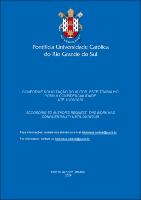| Share record |


|
Please use this identifier to cite or link to this item:
https://tede2.pucrs.br/tede2/handle/tede/11271| Document type: | Tese |
| Title: | Otimização do processo produtivo de L-asparaginase II recombinante de Erwinia carotovora em biorreator e análise da sua ação antileucêmica |
| Author: | Andrade, Bruna Coelho de  |
| Advisor: | Basso, Luiz Augusto |
| Abstract (native): | A enzima L-asparaginase II constitui um dos medicamentos de escolha para o tratamento poliquimioterápico de leucemia linfoide aguda (LLA) em crianças e adultos. As células leucêmicas utilizam a L-asparagina plasmática para a síntese de proteínas. Por meio do mecanismo de ação de hidrólise da L-asparaginase, ocorre depleção de asparagina no meio, resultando na interrupção da síntese proteica e indução de apoptose. A L-asparaginase II utilizada na clínica é derivada de Escherichia coli, no entanto aproximadamente 30% dos pacientes desenvolvem reações imunes contra a enzima, limitando sua ação terapêutica e necessitando da troca por diferentes preparações. Enzimas alternativas derivadas de subespécies de Erwinia apresentam um tempo de meia-vida inferior, embora sejam associadas com um risco reduzido de ocorrência de reações de hipersensibilidade, devido sua ausência de reatividade cruzada e atividade reduzida de glutaminase. O objetivo do trabalho foi otimizar o processo produtivo de L-asparaginase II recombinante de Erwinia carotovora em biorreator e analisar seu potencial antileucêmico. Foram adotadas diferentes estratégias de cultivo em biorreator para a produção da enzima em células de E. coli C43 (DE3), com as estratégias de alimentação DO-stat e linear. Os parâmetros cinéticos de cultivo foram avaliados quanto a rendimento, produtividade, atividade enzimática e taxa de crescimento microbiano. Com a obtenção da enzima recombinante e sua posterior purificação, foram realizados testes in vitro e in vivo, verificando seu potencial antileucêmico. Os maiores valores de atividade enzimática, rendimento por biomassa e produtividade foram obtidos utilizando a estratégia DO-stat com indução em 18 h de cultivo. Nos testes in vitro a enzima apresentou potencial citotóxico contra diferentes linhagens de LLA, reduzindo a viabilidade celular e induzindo a apoptose nas células. Nos testes in vivo a enzima demonstrou maior disponibilidade quando administrada via intramuscular e foi eficiente no aumento de sobrevida de camundongos C57Bl6/J transplantados com uma LLA murina primária. Com base nos resultados obtidos, verificou-se o potencial antileucêmico da enzima L-asparaginase II de E. carotovora contra células de LLA |
| Abstract (english): | The L-asparaginase II enzyme is one of the drugs chosen for the multidrug treatment of acute lymphoblastic leukemia (ALL) in children and adults. Leukemia cells use plasma L-asparagine for protein synthesis. Through the hydrolysis mechanism of L-asparaginase, there is depletion of asparagine in the plasma, resulting in interruption of protein synthesis and induction of apoptosis. The L-asparaginase II used in clinical practice is derived from Escherichia coli, however, approximately 30% of patients develop immune reactions against asparaginase, limiting its therapeutic action and requiring replacement with different preparations. Alternative enzymes derived from Erwinia subspecies have a shorter half-life, although they are associated with a reduced risk of hypersensitivity reactions due to their lack of cross-reactivity and reduced glutaminase activity. The aim of the work was to optimize the production process of recombinant Erwinia carotovora L-asparaginase II in bioreactor and analyze its antileukemic potential. Different bioreactor cultivation strategies were adopted for the production of the enzyme in E. coli C43 (DE3) cells, with the DO-stat and linear feeding strategies. Cultivation kinetic parameters were evaluated for yield, productivity, enzymatic activity and microbial growth rate. After obtaining the recombinant enzyme and its subsequent purification, in vitro and in vivo tests were carried out, verifying its antileukemic potential. The highest values of enzymatic activity, yield per biomass and productivity were obtained using the DO-stat strategy with induction in 18 h of cultivation. In the in vitro tests, the enzyme showed cytotoxic potential against different strains of ALL, reducing cell viability and inducing apoptosis in the cells. In the in vivo tests, the enzyme showed greater bioavailability when administered intramuscularly and was effective in increasing the survival of C57Bl6/J mice transplanted with primary murine ALL. Based on the results obtained, the antileukemic potential of the L-asparaginase II enzyme from E. carotovora against ALL cells was verified |
| Keywords: | L-asparaginase II Biorreator Leucemia Linfoide Aguda L-asparaginase Bioreactor Acute Lymphoblastic Leukemia |
| CNPQ Knowledge Areas: | CIENCIAS DA SAUDE::MEDICINA |
| Language: | por |
| Country: | Brasil |
| Publisher: | Pontifícia Universidade Católica do Rio Grande do Sul |
| Institution Acronym: | PUCRS |
| Department: | Escola de Medicina |
| Program: | Programa de Pós-Graduação em Medicina e Ciências da Saúde |
| Access type: | Acesso Aberto |
| Fulltext access restriction: | Trabalho será publicado como artigo ou livro |
| Time to release fulltext: | 60 meses |
| Date to release fulltext: | 10/06/2029 |
| URI: | https://tede2.pucrs.br/tede2/handle/tede/11271 |
| Issue Date: | 27-Mar-2024 |
| Appears in Collections: | Programa de Pós-Graduação em Medicina e Ciências da Saúde |
Files in This Item:
| File | Description | Size | Format | |
|---|---|---|---|---|
| TES_BRUNA_COELHO_DE_ANDRADE_CONFIDENCIAL.pdf | BRUNA_COELHO_DE_ANDRADE_TES | 432.89 kB | Adobe PDF |  Download/Open Preview |
Items in DSpace are protected by copyright, with all rights reserved, unless otherwise indicated.




